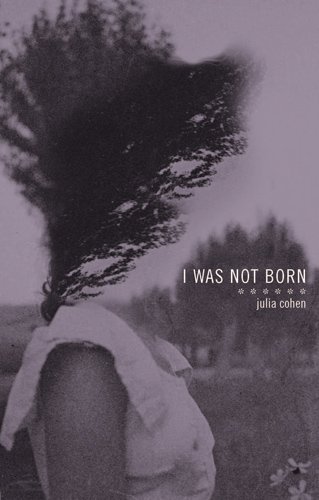I Was Not Born
When I finished Julia Cohen’s I Was Not Born I had the following reactions, more or less simultaneously: That really ends with a punch. I am not so sure what just happened there. I want to try something like this. Even from the first paragraph of the first essay, I knew that this was not going to be a traditional project. When I finished Julia Cohen’s I Was Not Born I had the following reactions, more or less simultaneously: That really ends with a punch. I am not so sure what just happened there. I want to try something like this. Even from the first paragraph of the first essay, I knew that this was not going to be a traditional project:
Born in deadlight? Stop teasing. Furnace full of patient stars. Here because I could not abandon love: coffee grounds, a box of opened cereal, cherry magnets. My bed unburdened by sex? To hold nothing against nothing. To hold nothing against.
I suppose some might call the majority of these pieces “lyric essays,” but many are clearly poems, and the rest are somewhere in-between. Perhaps this distinction only matters on the dust jacket. Each piece is spasmodically written, image after image after image, incomplete sentences abound. The language leaves no hope for the reader to keep up unless they’re really paying attention. This can be exhausting, but there’s a thrill in it, too, as one picks up snippets here and there of hints at a real life behind the fragments—her lover tried to kill himself, she wants an idyllic life, her friends are having babies, she says she’ll stay with him, she’s in therapy now, and a year later she breaks up with him but it hurts—but all this is shattered and scattered throughout the pages of these poems and essays. In one essay she even asks “Who can pay attention the longest?” as though she were asking if she, in her attention to herself and to her own feelings, could outlast even the reader’s willingness to follow along.
But the attention to and tension in the language is clear and wonderful, really something to revel in, even when the images and reveling may be more for her benefit than the reader’s. My favorite grouping of these seemingly random images—seemingly only because the reader isn’t given the key to the map, though there is never a doubt that Cohen knows exactly where she is going—comes from “Have I Been Removed From Something Larger?”: “I’m painting faces so they open. Matted hair, falling pollen, a broken neck. Shredded stones shift in the blanket. Up in the van, too hot for subtext.” She claims it was too hot, but the rest of the essay makes it clear that something is happening up in that van, though I was never quite sure if it was subtext or a wreck or perhaps both.
Another favorite line, this one from “To Sustain It”: “Is that a real poem or did you write it yourself?” The question sort of tingles all over. When I say that Cohen leaves no key for her maps, this may be a bit of an exaggeration. The first essay in the book “Of Recovery” and the last essay “A Year to the Day: A Love Supreme” are actually quite understandable in a lyric, braided way. There is unfollowable lyric, but in both essays, there are long segments of conversations with her therapist, written in dramatic dialogue. There are poignant, clear memories that need no context: “Remember: We write poems together by email, by text message, on car rides, side by side at the bar” and text messages she received from N, her lover: many are mundane, many are filled with emotional and sexual desire. The longest moment of clear prose in the whole book is an excerpt from an essay N began to write about his attempted suicide, describing how he wanted to listen to John Coltrane’s “A Love Supreme” as often as possible before he died, but he left the essay incomplete and for Cohen to ruminate over.
And, of course, besides the moments of narrative clarity, there are plenty of gems throughout the books that speak through the murky language of poetry, aphoristic statements that tell you how to read this book:
I feel like I have the tendency to obsess about many things &, not that there is a proper place to put something or that one should compartmentalize, but I feel like I don’t know how to quiet some thoughts down.
I would write about anything else if I could think of something other than N”
[T]o be healthy is to be another person
For example, this is a love poem to the poem. / For example, a love poem to you, confused by fear
I am trying to create a sincerity I can live with, which is not an obligation of the poem
This last is the real phrase to consider when deciding to read Cohen’s book or not. It is clear that she is reaching for sincerity, but it is one that she can live with. The reader does not feel any obligation to reach on their own. The reader can find plenty to love, to relish, and to muse on, but they will not find answers, only feelings, which are a sort of invitation. As she says, “If you give a feeling away / then someone can help.”





